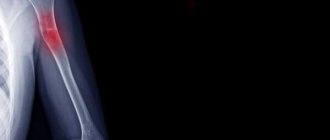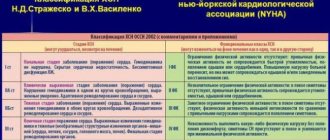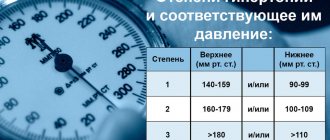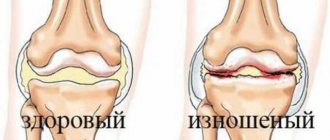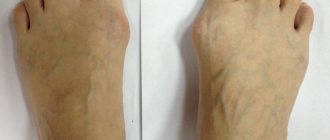Treatment of stage 2 hypertension, symptoms and causes
Stage 2 hypertension is arterial hypertension in moderate form. The upper blood pressure (systolic) is 160 - 179 mm Hg, and the lower blood pressure (diastolic) is 100 - 109 mm Hg. At this stage of the disease, periods of increased pressure are longer than with stage 1 hypertension. Arterial blood pressure in grade 2 hypertension rarely returns to normal.
Depending on the rate of change in the degree of hypertension, we can talk about normal and malignant arterial hypertension. In the second case, the disease progresses so quickly that it is often fatal. Hypertension is dangerous because an increase in the speed of blood movement through the vessels leads to thickening of their walls and an even greater narrowing of the arteries.
Risks of developing hypertension
The risk of developing hypertension or arterial hypertension - high blood pressure - consists of a number of factors. Accordingly, the more there are, the greater the likelihood that a person will become hypertensive.
Risk factors for developing hypertension:
- stress (stress hypertension) and mental stress. The stress hormone adrenaline increases your heart rate. It instantly constricts blood vessels;
- taking certain medications, for example, oral contraceptives, and various dietary supplements (iatrogenic hypertension);
- male gender;
- age over 35 years;
- pregnancy;
- diabetes;
- endocrinopathy of the adrenal glands, thyroid gland or pituitary gland;
- diseases of the hypothalamus;
- pyelonephritis;
- renal failure (nephrogenic hypertension);
- inactivity. Physical inactivity is accompanied by a slow metabolism - metabolism - and gradually weakens the body as a whole;
- excess salt in food. Table salt provokes arterial spasm and retains fluid in the body;
- excess body weight. Each extra kilogram increases blood pressure by 2 millimeters of mercury - mmHg;
- sudden change in weather;
- hereditary predisposition. The risk of getting sick is higher for those who have hypertension among first-degree relatives: father, mother, grandmothers, grandfathers, siblings. The more close relatives suffer from high blood pressure, the greater the risk;
- bad habits: smoking or drinking alcohol. Components of tobacco provoke spasms of blood vessels - involuntary contractions of their walls. This narrows the blood flow;
- atherosclerosis – blockage of blood vessels with plaques. Total cholesterol should not exceed 6.5 mmol/l of blood;
- chronic lack of sleep and other “provocateurs”.
Depending on the combination and degree of manifestation of the above factors, as well as the likelihood of cardiovascular complications in the next decade, there are 4 types of risk of developing arterial hypertension:
- low (risk less than 15%);
- average (from 15 to 20%);
- high (more than 20%);
- very high (more than 30%).
Risk factors for the appearance of arterial hypertension are also divided into 2 types based on the possibility of their elimination: correctable (correctable) and not. For example, a person may well quit smoking, but he is not able to change his ancestry. The amount of risk is summed up from a number of indicators. A patient with stage 1 hypertension who begins to abuse alcohol will significantly increase the percentage chance of developing complications.
Causes of arterial hypertension
Experts fail to establish the causes of arterial hypertension in 90% of cases. In 10% of cases, the disease can develop as a complication of another disease or as a result of taking medications. The risk of developing hypertension syndrome may increase due to several factors:
- hereditary predisposition;
- age and gender of the person;
- smoking;
- frequent stressful situations;
- drinking alcohol in large quantities;
- excessive consumption of salt in food;
- low mobility and obesity;
- kidney diseases;
- metabolic disorder;
- diabetes.
The danger of high blood pressure
The main danger of hypertension is its complications, leading to disability and death.
The most severe complications:
- from the heart - heart attack, development of arrhythmia, heart failure;
- in the brain - stroke, loss of memory and intellectual abilities (dementia);
- from the eyes - severe vascular disorders in the retina;
- kidney – the occurrence of failure;
- vessels - aneurysm (sac-like expansion) of the aorta, the rupture of which leads to almost instant death.
Prevention of hypertension
To prevent hypertension and possible complications of this disease, the cardiologist at the A-Media clinic recommends taking the following measures:
- quit smoking
- minimize alcohol consumption
- control body weight
- be sure to get eight hours of sleep
- establish proper nutrition
- engage in physical activity daily.
Contact the A-Media clinic for the treatment of hypertension, and our experienced cardiologist will help you avoid severe complications of this disease and significantly improve your quality of life.
What is stage 2 hypertension
Stage 2 hypertension is a condition characterized by a persistent increase in blood pressure to 160/100 and above. However, blood pressure rarely returns to normal on its own; drug treatment is required to correct the patient’s condition.
Stage 2 hypertension is more common in patients over 50 years of age and this is understandable. With age, changes occur associated with the deposition of cholesterol plaques and narrowing of the lumen of blood vessels, the load on the heart increases, which has to make more efforts to pump blood, and conditions arise for increased blood pressure.
Symptoms of stage 2 hypertension
Stage 2 hypertension has ambiguous symptoms and treatment. Increased blood pressure may be accompanied by the following symptoms:
- Throbbing pain in the temporal region;
- Swelling of the face, especially the eyelids;
- The facial skin is hyperemic, and spider veins appear over time;
- Hands swell;
- It gets dark in the eyes, “spots” periodically flicker;
- At the same time, there is aching pain in the back of the head;
- After waking up, there is no cheerfulness, fatigue and apathy persist throughout the day;
- Periodic noise in the head;
- Emotional lability – low threshold of excitability;
- Dilated blood vessels of the eyes (sclera);
- Compaction of the ventricular wall (resistance to blood flow is compensated);
- Involuntary urination due to renal failure;
- Heart rate increases with the slightest exertion;
- There are problems with remembering.
Hypertension of the 2nd degree, symptoms can change depending on its characteristics: a primary independent form or a secondary one, as a complication of another disease.
Risk 2 for stage 2 arterial hypertension
When establishing the risk of a characteristic illness, doctors take into account the age, gender, and presence of chronic diseases in the body of a clinical patient. This information helps predict clinical outcome and reduce the likelihood of serious health complications and disability. Risk 2 for arterial hypertension of the 2nd degree means that irreversible processes in internal organs under the influence of surges in blood pressure are observed only after 10 years, the probability of stroke and heart attack is 20%.
Types of arterial hypertension
The classification of arterial hypertension is based on various parameters, one of which is the origin. Based on origin, the patient can be diagnosed with:
- Primary arterial hypertension is caused by many factors, which are being elucidated by specialists all over the world. However, it has been reliably established that the basis of this disease is unfavorable heredity in combination with the factors acting on it. The vast majority of patients - about 90% - suffer from this type of arterial hypertension. This disease has a second name – essential hypertension;
- Secondary arterial hypertension manifests itself when organs involved in the regulation of blood pressure are damaged, therefore the disease is otherwise called symptomatic arterial hypertension.
Arterial hypertension 2 degrees risk 4
Risks of arterial hypertension 2 degrees The presence of a “bouquet” of diseases (atherosclerosis, diabetes, ischemia) allows us to state that the patient has acquired a diagnosis of hypertension 2 degrees, 4 risk. Arterial hypertension at this stage only complicates the situation. This diagnosis is given to patients who have survived 1-2 heart attacks, regardless of the affected area.
It should be clarified that one hundred risk is a predictable concept, not an absolute one. It only indicates the likelihood of a complication developing. If the patient understands the danger of his situation and takes appropriate measures, the diagnosis can be corrected. Hypertensive patients who adhere to a healthy lifestyle and constantly monitor their condition can live a long and fulfilling life.
While with a burdened anamnesis and high risk, life expectancy is significantly shorter. Timely diagnosis and adequate treatment aimed at reducing blood pressure can extend your life and improve your quality of life.
Symptoms
The main symptomatic manifestations of the disease appear at the beginning of the development of hypertension (at stage 1). Blood pressure periodically rises, headaches, a feeling of nausea, tinnitus and black spots before the eyes appear, problems with sleep begin, and the heartbeat quickens from any exertion.
But if at stage 1 of the disease the upper pressure only sometimes rises to 140-159 mm Hg, and the lower to 90-99 mm Hg, then stage 2 hypertension is a pressure of 160-180/100-110 mm Hg .st. It becomes almost permanent, causing a person a lot of inconvenience and depriving him of the opportunity to live a full life without the help of medications. At the second stage, new symptoms are added to the general symptoms characteristic of phase 1 hypertension. This:
What is a hypertensive crisis
- feeling of chronic fatigue, including immediately after waking up;
- low threshold of emotional excitability;
- nausea, during a crisis turning into vomiting;
- pulsation in the head area;
- heart failure;
- increased sweating;
- hyperemia of the skin of the face and upper body;
- deterioration of vision, development of fundus pathologies;
- swelling of the face, worsening in the morning;
- chills, numbness of fingers and upper extremities;
- albumin proteins appear in the urine (microalbuminuria);
- arterioles narrow;
- the walls of the ventricle become denser, trying to resist blood flow;
- if the disease has caused pathological changes in the functioning of the kidneys, symptoms such as uncontrollable urination at night, swelling of the feet after sleep, cloudy urine or a pink color appear.
At this stage, hypertensive crises occur, during which the pressure rises by 59 units. Attacks last for several hours and threaten serious consequences in the form of a heart attack, cerebral, pulmonary edema or stroke. Signs of damage to target organs (brain, heart, eyes, kidneys) become obvious. Treatment should begin immediately after the first manifestations of the disease are detected. This will help cope with further destruction of organs and systems and improve the patient’s well-being.
Important! The diagnosis of arterial hypertension of the 2nd stage can also be made in patients whose blood pressure falls within the pressure range at stage 1 of the disease. Doctors focus not only on the tonometer readings, but also on the degree of target organ damage. If the brain, heart, eye vessels, kidneys are damaged, the disease progresses to stage 2.
Treatment of stage 2 hypertension
How to treat stage 2 hypertension? The scheme is drawn up by the local therapist. If necessary, a consultation with a cardiologist and neurologist is scheduled. Traditional methods of treating stage 2 hypertension include:
- To eliminate blood thickness (thin the blood flow), you should take Aspirin, Cardiomagnyl, Heparin, Aspicard.
- To normalize blood pressure, diuretics (diuretics) are prescribed, such as Diuver, Furosemide, Piretanide, Torasemide, Veroshpiron, Ravel.
- For this diagnosis, thiazides (thiazide drugs) such as Arifon, Chlorthalidone, Indapamide are recommended.
- To reduce blood cholesterol, you should take lipid-lowering drugs such as Atorvastatin, Atoris, Liprimar, Zovasticor.
- In order to dilate blood vessels, antihypertensive drugs of different groups are prescribed, such as Physiotens, Artil, Bisoprolol, Lisinopril.
It is important to consider that the quality of treatment largely depends on compliance with the instructions for their use. Self-medication for hypertension is dangerous. Such experiments can result in disability. The therapist selects the treatment regimen individually, taking into account the age, build and other health characteristics of the individual patient.
Features of treatment
Every hypertensive person is concerned with the question of whether arterial hypertension can be cured. Traditional methods are powerless here. Treatment is complex and depends on the form of the disease, the condition of the internal organs and concomitant pathologies. Cardiologists prescribe a number of drugs that complement and enhance each other’s effects in order to bring the tonometer readings closer to 130/80 mmHg. This:
- Angiotensin-converting enzyme inhibitors;
- Beta blockers;
- Angiotensin 2 antagonists;
- Calcium channel blockers;
- Diuretics;
- Antagonists of Renin.
Drugs and their dosage are prescribed strictly individually. This takes into account the patient’s age, weight, medical history and blood tests. It is necessary to strictly adhere to the therapeutic regimen, without independently changing one drug for another, canceling treatment or increasing the number of tablets. When taking many antihypertensive drugs, an addiction syndrome occurs, so abrupt withdrawal can lead to a hypertensive crisis.
Important! The prognosis of therapy is not always favorable. It depends on the characteristics of the course of the disease, concomitant disorders, and the timeliness of treatment started. What are the risks of stage 2 hypertension? Risk 2 is disability.
Diet for hypertension
In order for the kidney vessels to function normally, hypertensive patients with any stage of the disease must adhere to certain nutritional rules. For example, it is important to control the water and salt balance of the body, to prevent the formation of stagnation and, as a consequence, stage 2 hypertensive crisis. Fatty, fried, sweet and smoked foods are prohibited.
Seven foods that lower blood pressure:
- Blueberries – Blueberries are rich in natural substances called flavonoids.
- Fresh leafy greens such as fenugreek leaves, kale, mint leaves, patchouli, dill greens, mustard leaves, curry leaves, beet greens, Swiss chard, arugula, broccoli, celery and spinach are high in potassium
- Potatoes - contain a lot of potassium and magnesium
- Beets – Nitrates in beet juice are known to lower blood pressure
- Skim milk is an excellent source of calcium plus low fat levels
- Oatmeal is a high-fiber, low-fat, low-sodium food.
- Bananas – Adds potassium to your diet.
Therapeutic nutrition for stage 2 hypertension allows boiled lean meats, cereals, vegetables and fruits on the menu. Green tea and diuretic herbal decoctions have beneficial properties.
Prevention of arterial hypertension
Giving up bad habits and normalizing lifestyle are the basis for preventing hypertension. Knowledge of the principles of preventing hypertension allows you to prevent the disease, facilitate its course, and also eliminate possible complications. Experts distinguish between primary and secondary prevention.
Primary prevention is to prevent the development of hypertension. People at high risk of developing arterial hypertension should not only fight bad habits and adhere to the principles of proper nutrition, but also monitor their physical activity.
Secondary preventive measures are carried out for people with an established diagnosis, for example, gestational hypertension. The efforts of doctors and patients are aimed at preventing complications. Secondary prevention consists of two components: arterial hypertension (treatment with tablets) and non-drug treatment.
Doctors at the Yusupov Hospital have extensive experience in treating arterial hypertension. The quality of services provided in the hospital is at the European level. All diagnostic and treatment procedures are performed using the latest medical equipment. The rooms are equipped with maximum comfort for patients. You can make an appointment with a doctor by phone.
Folk remedies
When treating illness at home, many people prefer to use folk remedies. This therapy involves the use of medicinal plants that have a positive effect on the cardiovascular system.
You can treat the disease with the following recipes:
- Treatment can also be carried out with peppermint, cinquefoil, chamomile, and yarrow. These herbs go well together.
- Prepare a decoction of motherwort, horsetail, marsh cudweed, and valerian root. All plants must be taken in the same quantity. This remedy has diuretic effects and allows you to cope with single surges in blood pressure.
- Bee products and citrus fruits are actively used in the treatment of hypertension.
- You can treat with viburnum juice. To reduce blood pressure, it should be consumed three times a day, a quarter glass.
Folk remedies help cope with unpleasant symptoms of the disease and speed up the effectiveness of traditional therapy. Such recipes have proven their benefits over many centuries. People whose bodies do not tolerate medications well turn to this type of therapy. But it is important to remember that treatment of the disease with traditional recipes can only be carried out after consultation with a doctor.
Diagnosis and treatment of hypertension
Diagnosis of the disease
Diagnosis of hypertension at the A-Media clinic is carried out using the following methods:
- blood pressure measurement
- ECG
- 24-hour ECG monitoring with blood pressure (Holter monitoring)
- echocardiography (echocardiography or ultrasound of the heart)
- Ultrasound of the abdominal cavity with kidneys
- Ultrasound Dopplerography of the BCA (ultrasound Dopplerography of brachiocephalic arteries and veins).
Treatments for hypertension
Treatment of hypertension in our clinic is planned by a qualified cardiologist only after an accurate diagnosis has been made.
First step: Our doctor will take measures to lower the patient's blood pressure.
Further therapy is planned individually based on the type of hypertension. Mild and moderate forms of the disease can be treated with medications. For severe hypertension, antihypertensive drugs are always prescribed. Lifestyle modification is a prerequisite.
Prevention
Your healthcare provider will likely also suggest a variety of lifestyle changes, including:
- Maintaining a healthy weight;
- A diet rich in fruits, vegetables and low-fat dairy products;
- To give up smoking;
- Limiting salt intake in the diet;
- Limit alcohol consumption. For most adults, this means that it is normal to drink up to one drink per day for women of all ages and men over the age of 65, and up to two drinks per day for men 65 or younger;
- Exercise at least 30 minutes a day. These include walking, jogging, strength training, yoga, and cardio exercises such as cycling.
On your part, methodical adherence to medical recommendations and organization of the correct regimen are required. A healthy lifestyle is the path to recovery. Remember this.
Arterial hypertension: treatment with modern methods
The choice of treatment for hypertension is made by specialists based on research data. Treatment methods for arterial hypertension are divided into non-pharmacological and medicinal.
Patients diagnosed with mild hypertension, in particular stage 1 arterial hypertension, may be exempted by their doctor from taking special medications. The main method of non-drug treatment is changing the patient’s lifestyle:
- rejection of bad habits;
- weight control;
- regular moderate physical activity. Daily activities such as moderate walking or light strength training are effective;
- reducing stress. During stressful situations, a person’s blood pressure may increase; it can be lowered with the help of massage, breathing exercises or meditation;
- including foods rich in macro- and microelements in the diet and reducing salt intake.
Medicines for arterial hypertension are prescribed to patients when non-drug therapy has proven ineffective within 3-4 months, and there are risk factors. Thus, arterial hypertension 2 risk 3 requires taking special medications. The number of drugs is determined by blood pressure and the presence of concomitant diseases.
Modern doctors prescribe drugs for the treatment of arterial hypertension in accordance with one of the strategies: monotherapy or combination therapy. When drawing up a treatment plan, the question of the admissibility of using one drug is the most pressing for the specialist.
In monotherapy, a patient with grade I is prescribed one drug at the beginning of the course of treatment. An important factor when prescribing a drug is its effectiveness in reducing the risk of complications. Currently, to control blood pressure, doctors use the most studied drugs belonging to two groups: thiazide-like and thiazide diuretics, which have a diuretic effect.
Combination therapy is prescribed to patients with a high degree of risk, as well as with stages II and III of the disease. With this method of treatment, drugs with different mechanisms of action are selected to lower blood pressure and reduce possible side effects.
Experts on the question of how, if a patient has arterial hypertension, how to treat this disease with drugs, prefer to use several groups of drugs:
- beta blockers. For several decades, beta blockers have been used as the mainstay of treatment for hypertension in children and adolescents. However, multiple side effects have now been identified, and therefore their use has become limited. Experts include the main side effects: sleep disturbances, increased blood glucose levels, weakness and mood swings. An important condition when using these funds is an electrocardiogram and regular monitoring of blood sugar;
- Diuretics are prescribed to patients for a long period; they remove excess fluid from the body. Side effects include: fainting, decreased calcium levels in the blood;
- calcium channel blockers. Drugs in this group are used quite widely to treat patients; doctors give preference to drugs with a long period of action. Side effects of blockers include: gastrointestinal disorders, rapid heartbeat, weakness, dizziness and swelling;
- ACE inhibitors. The mechanism of action of these drugs is to block the action of enzymes that are involved in the formation of a vasoconstrictor;
- alpha adenoblockers. The effect of drugs in this group is manifested in a decrease in pressure through blocking receptors located in the artery wall.






